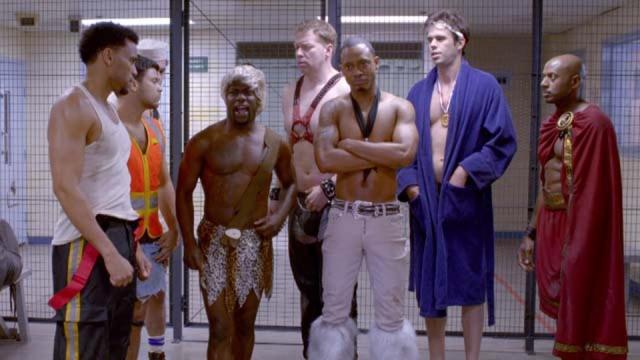As I watched Think Like a Man Too, the most recent product from writers Keith Merryman and David Newman who brought you that wholesome flick, Friends with Benefits, I couldn’t help but think of the climbing divorce rate in America. In a culture that is increasingly devaluing marriage (sadly more often than not treating it as a fashion to be dispensed when no longer convenient — though I do want to go on record saying divorce can sometimes be appropriate), Think Like a Man Too exemplifies it to a degree that ranges from hopelessly depressing to downright maddening.
In fact, part of me is even impressed by how much this movie affected me; I left the theater legitimately boiling from its aftertaste, much as I did after watching the critically acclaimed but also morally vapid, Sideways (starring Paul Giamatti and Thomas Haden Church), in which Church’s character gets involved in an affair that he proudly manages to hide from his fiancé by the film’s end (all while Giamatti’s character looks on from a distance with satisfaction).
Yet, it’s not the actions of moral depravity that upset me in film/television. Those who know me will know I am a huge fan of shows like Breaking Bad and Game of Thrones, which are both bursting at the seams with immoral actions throughout. The difference between those examples and Think Like a Man Too is purely the message you’re left with. Either being one that condemns those actions and provides consequences (as the former two do), or one that is all too comfortable with that behavior, sometimes even to the extent of promoting it — and Think Like a Man Too couldn’t do this more.
For those who haven’t seen the first Think Like a Man (and if you have, I won’t judge you for denying it), the film chronicles an interconnected series of couples as they wrestle with conflicting expectations and preferences on relationships. Holding such stereotypical nicknames as “The Player,” “The Non-Committer,” and “The Girl Who Wants a Ring,” the characters and their significant (to varying degrees) others struggle to maintain any sort of a healthy relationship that points to long-term success due to their self-centered mindsets regarding relationships.
In the first film, which largely focuses on the ladies’ perspective (hence the title), the women discover a book of [terrible] relationship advice, which they then use to get what they want from their unsatisfactory significant others. Of course, it wouldn’t be fair if there was no sequel for the guys to have their turn, and so thus Think Like a Man Too was born.
Think Like a Man Too follows up the events of the first film with the group arriving in Vegas for the wedding of their friends Michael (played by Terrence J) and Candace (Regina Hall). The film mainly chronicles the events of the bachelor party, but before that each character is briefly reintroduced (for those lucky enough to have missed the first film), and it isn’t long before the audience gets a deep understanding of their flaws, which at times are, shockingly, even intended as comic relief.
But there’s nothing funny to me about a group of men whose ideas of relationships have nothing to do with commitment, exclusivity, or integrity. Cedric (played by the tireless Kevin Hart), Michael’s faux-best man — “faux” as in Michael intended for his best friend Dominic (Michael Ealy) to be his best man, but Cedric thought he was pointing to him so they all awkwardly decided to go with it (because why not?) — attempts throughout the bachelor party to get the groom to indulge in strippers and enough alcohol to make his future self of 12 hours weep. The other members of the group in the meantime go along with this with varying levels of acceptance, yet none of them do anything to limit it.
What becomes infuriating to watch over the 106 minute runtime is that every continuing instance of the groom’s degradation is given an atmosphere of acceptance and justification. The filmmakers clearly want you to laugh at the chaos and ridiculousness of the night, but it’s not because the night is a failure and these characters are stumbling on their way to redemption. To them, and unfortunately most of the audience, this is how a bachelor party is supposed to go down, and anything otherwise is a failure.
Even more unfortunate, however, is that this low-brow comedy comprises of a superbly talented cast. For all the distasteful, cliche, and unoriginal dialogue throughout, the actors sell their roles. Cedric in particular, while a horrible faux-best man, does play his character with an impressive level of energy and authenticity. Furthermore, Loretta (Jenifer Lewis), the mother of the groom, sells the unapproving and over-protective old woman in a performance that is sure to go down among the best film portrayals of that type.
Yet what was perhaps saddest of all is that when the events that transpire result in the groomsmen (and their counterpart bridesmaids who have been having their own equally empty bachelorette party) getting thrown in jail and arriving late to the now-cancelled wedding, the actions that caused this are not condemned. And there is where my problem with the film’s message lies.
The movie ends with the group finding a way to go through with the wedding later that night after all; The couple says “I do,” everyone cheers, and the credits roll with the newly formed husband and wife living happily-ever-after.
But that is complete bullshit.
As I touched upon earlier, shows like Breaking Bad and Game of Thrones would have resulted in the characters not finding immediate gratification. They would have paid the price and hopefully learned from their mistakes, or at least realized that there was an issue with them to begin with. If there’s anything Think Like a Man Too does well, it’s exemplify a culture where the sanctity of marriage is fading away in place of one where a wedding ring is nothing more than a symbol of two people being slightly more committed than before. Unfortunately, nothing in the film convinced me it will last.



















